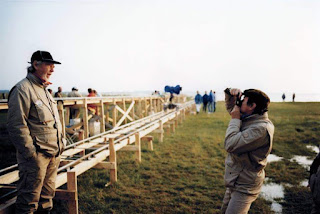Stalker (1979), Andrei Tarkovsky
Potentially the greatest Soviet auteur to ever live, works his way of uncertainty on the making of 'Stalker' with having left out the spiritual insurgence that was phenomenally established in 'Andrei Rublev' and even in his most credible art on reminiscing, that unfolds in his autobiographical supremo 'Mirror'.
Every recognizable thrust of alliteration of poetics and complexity or even the wake of contemplation on spirituality and religion that fundamentally shapes the pieces, enabling our perception on his narrative fashion has been disregarded with a convolution of humane tendencies, the sole reasoning of which is the disposition of philosophical outlays, binding the absolute entirety of the film in a very perceptible method.
On actual contrary to that of 'Mirror' that uses the fractured density of complexities as its way to redeem the nostalgia of a character, making the veritable narrative rather tough on comprehension, 'Stalker's' narrative might be one of the most simple and effortless tracks that have been used in cinema. It is one of those factors that comprise the greatness of 'Stalker', doesn't matter how identifiable and overlooked that might be.
Probably the most expressionist filmmaker just after Sergei M. Eisenstein, Andrei Tarkovsky makes his motive of visuals vibrantly significant by inventing or modifying his style on the allegorical aspects that enchantingly results in quite possibly the most neglected precursor to the Sci-fi genre of the modern cinematic world levitating the expressionistic grandeur to elude the cliched stream of complexities and apocalyptic visions.
'Stalker' stands out with a graspable linear simplicity and an ambitious existential depth that prioritizes on the human condition and its dominant subconscious, to an extent. Tarkovsky's impenetrable mise-en-scène on building a perfect sequence of enchantment makes sure of that.
Bringing out a brief context of the plot would never be possible without happening to question the significance of the alluding title of it.
The starkness of it's conception deliberately asks the primordial question - Who is the Stalker?
Before constructing a definitive and rational sketch of the role of the Stalker, a little divulging into the innate plot might help. Our functional assessment based on 'Solaris' may deceive our understanding on the aimed particularity of it. While 'Solaris' may or may not have used symbolism in its screenplay, 'Stalker' rules out any such usage, both via being extremely expressionist in it's approach and the auteur's confirmation about it's allegorical intricacies that it loosely formulates from the novel 'The Roadside Picnic'.
Now the plot takes three people, The Writer, The Professor and most definitely The Stalker, into a forbidden area called the Zone, at the heart of which is the Room, where your deepest wish will come true. It is this simplicity that gives the film its fathomless resonance.
Where the incubating idea of uncovering the truths behind the heavily guarded mystic 'zone' is initiated by The Stalker, his persuasion gradually allows the other couple of acquaintances to join his voyage.
Finally back to the cliffhanging question- Who is the Stalker?
Since a brief context of the plot has been given to your advantage of perception, The Stalker is an utterly regular individual who somehow has the persuasive capability or rather sort of manipulating men to appease his curiosity of invading the forbidden and heavily scrutinized wasteland with armed militants, where a supposed zone lies and that too with a divine room, granting people's heartfelt desires once laid before it.
Seeing the perfectly composed apocalyptic utopia, the traits of The Stalker is rational and understandable, which eventually prepares a general and self-analytic and insightful effect.
Even though the mentioned simplicity that it bears, Tarkovsky's characters are quite opposite to simpleness as we come to realize that there are no idiosyncratic personal traits that has been presented.
The Stalker is Stalker. The Writer is Writer. The Scientist is Scientist.
The Stalker's wife is Stalker's Wife. The eradication of identifiable background makes the film already larger than the core notion it presents- Confrontation of the very desire of man!
Even though drenched in an epiphany, 'Stalker' is such existential prose that often raises conflicts and leaves us with non-crystal answers, forcing the film's mechanism to surpass itself in a gradual motion. How can a film surpass itself ? Now that's a direct contradiction to its laid foundations in the first place. The inexplicable perplexity that you probably experiencing while reading this is nothing compared to that of the actual film.
The Stalker that is hell-bent on discovering about the zone to probably make his wishes fulfilled, doesn't quite fathom the nature of the divinity whereas the respect that it demands is fully comprehensible to him.
The extraordinaire that sets 'Stalker' apart from other tons of philosophical films is the very confrontational conflicts that it arises.
The marginal space of relative interpretation that Tarkovky's grand humane exploration leaves, allows me to build a modest idea which being is that the zone is a literal non-existent space that has made it's existence viable through the unfazed desires of the human heart and more than its context from a dystopian wasteland, the human psychology has made it's actuality real.
Tarkovsky has deliberately proven the core conflict by a negative approach through the three ramblers that on the initial moments of the film stares right into our face and yet we fail to decipher -
"How can I put a name to what it is that I want ?"
The soliloquy of The Stalker is the very explanation of the film's context. We don't know ourselves well in the first place to be able to figure out our psychological processes into grasping our desires.
With an enhanced approach of belief in divinity and faith in one's own self, the film has even maintained literary characteristics of relevance and even subdued political criticism of the Soviet Union in its screenplay which plays as a necessary trait to the brilliant track of the narrative.
With one of the absolute elitist conclusion sequences in the history of cinema, that probably hints in the not so distant evolution of humanity in it's a psychological plethora, the open ended mystic tail again leaves us with contradictory settlements on the film's message, even though the cathartic yet chaotic perfection it achieves while doing so.
As being Tarkovsky's most ambitious work, the magnificently haunting and unnerving cinematographic technicalities of editing and camera movements with colour tones perfectly complimenting every approach of the narrative will unarguably put you in an introspective numbness that it undeniably did to me.
'Stalker' is a cinematic experience that will never be equalled, let alone be surpassed.







Comments
Post a Comment